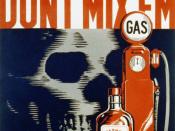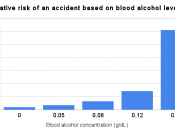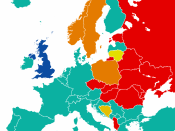It is always heartbreaking to hear the news that four innocent kids lost their beloved mother in a drunk-driving related accident; of a family having only the memories of their son to treasure on Christmas Day after he was killed in a suspected drunk driving crash; or of a 19 year old man who got hit by a car for the same reason. These three incidents are just among the many casualties that happened this past three months in the Greater Toronto Area because of the recklessness of irresponsible citizens. It has come to my attention that safety in our community has been so unpredictable. Our roads have become unsafe and it is imperative that effective measures be undertaken to ensure road safety. We all use the roads one way or the other and the safety of each and every citizen must be looked after.
Impaired Driving, otherwise known as 'Drunk Driving' has been considered as one of the biggest risks in Canadian roads.
The numbers of lives affected by this so called 'social crime' have been incredulous. In fact, it was estimated by the Toronto Police Services that as many as 70,000 Canadians are impacted every year by drunk drivers. According to the Traffic Injuries Research Foundation (TIRF) the number of lives in Canada that were lost due to drunk driving related accidents was 905 in the year 2000 and 815 in the year 2004. Although there had been a slight decrease in these alcohol-related traffic fatalities, its numbers pose a concern. The Federal government has recognized this issue and came up with measures to help approach this problem. Drunk driving has been made a punishable offense. Despite its being punishable, it appears that many people never have taken the sanctions imposed by the Canadian government on impaired driving seriously. A maximum of 90 days in jail and a three-year driving suspension did not awaken these violators. Instead of reducing drunk driving incidents and fatalities, these sanctions have resulted in having more social drinkers apprehended for the violation. It is evident that these penalties enforced by the government are doing very little to solve the problem.
I have thought about this matter and have come up with a proposed solution that will eventually reduce the incidence of drunk driving accidents and fatalities throughout Canada. Since most people do not observe the rules and regulations implemented by the Federal government regarding this matter, I propose not to make drunken driving an offense since it has not been effective in maintaining road safety. Stubborn people still thrive out there and continue to drive even when under the influence of alcohol. As a matter of fact, in a 2006 survey conducted by the TIRF, an estimated 1.7 million Canadians report that they have driven in the past 12 months even if they were over the legal alcohol limit, which is 80 milligrams of alcohol in 100 milliliters of blood. Therefore, an alternative solution, which I propose must be taken into consideration seriously. My proposition will benefit society in general since it will result to much safer roads and consequently safer communities.
Every proposition has always its advantages. The knowledge that driving while intoxicated with alcohol is no longer an offense will compel other drivers to be more cautious and alert on the road. The awareness of the probability that drunk drivers exist on the roads would instill fear and apprehension among drivers causing them to be more careful with their driving. They will tend to be more alert and will always be on the look out for drunk drivers. Should they see a drunk driver ahead of them swerve, drive on the wrong side of the road, drive the wrong way down a one-way street, or speed through red lights, they will be forced to slow down and drive defensively.
The knowledge that drunken driving is no longer a punishable offense will open the doors for car owners to look at alternative option, to ensure road safety. They may opt to take public transportation thereby offering a solution to road congestion and at the same time provide more income to the government who operates almost all of the transportation services in the country. Increase in government income will mean more money to spend for needed social services in lieu of raising taxes.
Some people would argue that alcohol could impair driving since it slows down the activity in the central nervous system. This means that alcohol slows down the body's response time to unexpected situations. I agree to the contention but it is also probable that some people tend to drive more safely after drinking alcohol knowing that their reaction time has been affected and therefore affect also their ability to drive. This makes them more attentive and conscientious in their driving situation. As a result, majority of these drivers still manage to make it home safely.
Nevertheless, there are also some people who are too inebriated that they end up slamming their car on a tree, a lamppost or on a building; even worst, hit another drunk driver on the road, ending up both dead. It would provide a consolation to the community to hear of such incidents. This will reduce the number of drunk drivers in the roads responsible for the deaths, injuries and property damages in their community.
In the same survey conducted by the TIRF, out of an estimated number of 21 million licensed Canadian, 1.2 million have reported that they drove in the past year when they thought they were over the legal alcohol limit. Compare it to the number of deaths in the same year which is 815. The number of lives that were lost is only 0.07 percent of the total number of drivers who drink and drive. The 815 people who have died appear insignificant compared to the 1.2 million people who have admitted to driving while intoxicated. Therefore, it is no big deal when viewed in this perspective. The police would have more time to devote fighting other crimes, instead of testing blood alcohol levels of these honest, law-abiding drivers. Under the present situation, police tend to arrest those who exceed the maximum level of alcohol content in their blood with the pre-conceived notion that the presence of these people in the roads increases the possibility of causing an accident. As a result, these people, who have not been involved in accidents get apprehended and charged with the offence because of the alcohol level in their blood. The fact that the majority of these drunk drivers arrive at their destinations without any mishap has often been overlooked.
Many people will argue against my proposition. A common objection will be the argument that there is an even greater possibility that someone could die or someone else would get hurt if such acts will just be tolerated. Indeed, many people are going to be affected by this. But look at it this way; some people have to suffer for the greater good. Besides, these people who will be affected are careless citizens, who fail to take the necessary precautions while on the roads. It is not always the driver's fault that someone gets hit by his car. If people proceed with extra care and alertness of surroundings, such casualties can be avoided. People may contend that such things are sometimes unavoidable, especially when it happens during the night. All right, then. There are cases when such things happen unexpectedly, but isn't life unpredictable? People never know when and how they are going to die. It just happens that fate has caught up with them. Who are we to go against fate? Therefore, let no one speak subjectively against my proposition, unless he comes up with a better scheme and put it into practice.
I have no vested interest regarding this matter. After all, my only motive is for the greater good of the whole community. I am just an ordinary citizen primarily concerned with the preservation of human life and the safety of my fellow citizens. My proposal is the most feasible solution in these times when nobody has yet come up with the best alternative.
Work CitedVanlaar, W., Simpson, H., Mayhew, D. & Robertson R. (2006). "The Road Safety Monitor 2006:Drinking and Driving." Ottawa: Traffic Injuries Research Foundation, 2006. 02 March 2007.
"Drunk Driving: Progress and Problems". Ottawa: Canada Safety Council, 2005. 03March 2007.






